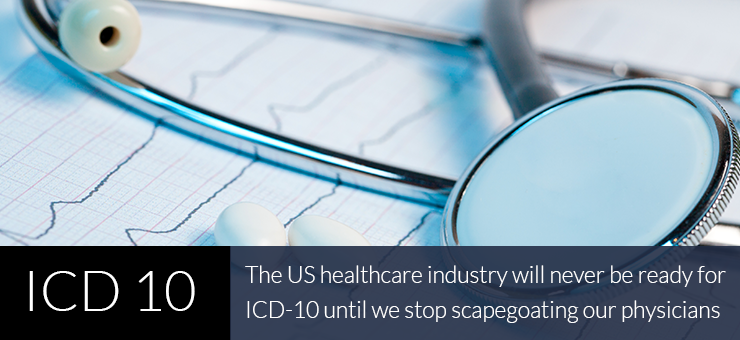This would have been the second week of the ICD-10 era in American Healthcare, had the Congress not intervened to delay its implementation. It was believed that giving more time to EHR vendors, providers and payers will result in a relatively smoother transition.
So now, it’s only fair to ask if the government policy worked? Are we better prepared to handle the ICD-10 phenomena now, then we were a few months ago?
The simple answer is no.
We are asking too much of our physicians by expecting them to change their workflows, implement all sorts of technology, and comply with a multitude of government regulations, while their ability to undertake these changes is compromised due to the constraints on their revenue stream.
Thus, it should come as no surprise that the government’s “delaying policy “has not achieved the desired results. The healthcare industry is not any closer to achieving ICD-10 readiness now, than it was a few months ago. In its recent survey, Workgroup for Electronic Data Interchange (WEDI) has corroborated what many anti-ICD-10 delay forces feared, i.e. that the delay has negatively affected preparedness timeline with providers, payers and vendors all letting critical tasks slip into 2015. The report suggests:
“It appears the delay has negatively impacted provider progress, causing two-thirds of provider respondents to slow down efforts or place them on hold.”
Thus, it can be expected that the implementation, even if it kicks in next year, is going to be as painful for practices as it would have been in 2014 – especially for small and medium-sized practices.
Who is to be blamed for this state of affairs? Is it the physicians who are slow in complying with government requirements, or is it something else?
I believe the problem lies with the policy of driving the healthcare evolution on the backs of the physicians, with little accountability for other stakeholders.
For starters, just imagine the cost of transitioning to ICD-10. According to an AMA (American Medical Associates) study the potential costs that will be incurred by practices for the ICD-10 transition are:
- Small practice: $56,639-$226,105
- Medium practice: $213,364-$824,735
- Large practice: $2,017,151-$8,018,364
These costs are beyond what a small or medium-sized practice can afford. Also, many EHR vendors are transferring the cost of ICD-10 preparedness from themselves to physicians (especially if you have a server-based system rather than a cloud-based EHR), by asking them to pay thousands of dollars for this up-gradation.
Add to this the burden of meaningful use compliance, audits, and cuts in Medicare reimbursements, and what you have is an impossible situation for independent physicians – They simply do not have the resources and this situation is not going to get better by just delaying the deadline.
Unequal regulation in Healthcare
Both providers and health IT vendors are important stakeholders and participants in the healthcare industry. Yet, the amount of regulation imposed on them by the government is polls apart. If a physician does not comply with government standards or fails to meet the regulatory requirements, he is penalized while the government treats HIT vendors like its favorite child. They face no penalty if they fail to upgrade their certification on time. In fact, it is again the physicians who suffer as they are required to change their vendors if they want to avoid penalties in the future.
Even for ICD-10, there is no governmental pressure (penalties or threat of revoking certifications) on vendors if they fail to comply with an acceptable readiness timeline. Thus, most are not even close to getting ready which will create problems for physicians, as they will not have enough time to prepare at their end
In short, a moral hazard has been created. The EHR vendors are not stressed; they know they face no backlash from the government. Even from the physician’s side – providers can only cry foul as they are stuck in long term contracts with their vendors. Again, it is the providers who will suffer as they can either pay to get out of these contracts or stick with these vendors bearing the burden of a very steep ICD-10 readiness timeline.
To conclude, as long as this unequal regulation remains in place, where physicians need to take responsibility for all major healthcare changes while other stakeholders remain scot-free, the Healthcare industry will never be able to evolve at the speed that the government wants and expects.
In such an environment, ICD-10 – whenever it comes – will be a bitter pill that providers would have to shove down their throats. However, if meaningful reforms are introduced where the burden of healthcare evolution is shared equally, we can expect a greater and speedier change. Thus, the government needs to do much more than “delay deadlines.”
If you want to know more about ICD-10 conversion and its impact on your practice, Download Free E-book on “Successful ICD-10 Conversion”
